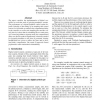Free Online Productivity Tools
i2Speak
i2Symbol
i2OCR
iTex2Img
iWeb2Print
iWeb2Shot
i2Type
iPdf2Split
iPdf2Merge
i2Bopomofo
i2Arabic
i2Style
i2Image
i2PDF
iLatex2Rtf
Sci2ools
102
click to vote
ECRTS
1999
IEEE
1999
IEEE
Improved scheduling of control tasks
The paper considers the implementation of digital controllers as real-time tasks in priority-preemptive systems. The performance of a digital feedback control system depends critically on the timing of its sampling and control actions. It is desirable to minimize the computational delay in the controller, as well as the sampling jitter and the control jitter. It is shown that by scheduling the two main parts of a control algorithm as separate tasks, the computational delay can often be reduced significantly. A heuristic method for assigning deadlines to the parts is presented. Further modifications are given to reduce the jitter and to facilitate delay compensation. The result is improved control performance under maintained schedulability.
Related Content
| Added | 03 Aug 2010 |
| Updated | 03 Aug 2010 |
| Type | Conference |
| Year | 1999 |
| Where | ECRTS |
| Authors | Anton Cervin |
Comments (0)

